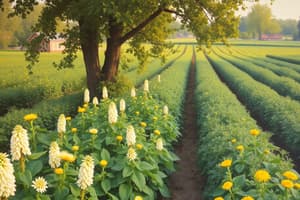Podcast
Questions and Answers
What were the two basic forces responsible for the revolution in English agriculture during the eighteenth century?
What were the two basic forces responsible for the revolution in English agriculture during the eighteenth century?
- The increase in population and technological advancements
- The desire to get rich and the increase in population (correct)
- Wars and the price of food
- The increase in population and the import of foreign grain
What was the agricultural system at the beginning of the nineteenth century, as mentioned in the text?
What was the agricultural system at the beginning of the nineteenth century, as mentioned in the text?
- Villagers owning individual fields with a variety of crop rotations
- Technologically advanced system with modern implements and mechanized sowing
- Open-field system with scattered strips and customary wheat-barley rotation (correct)
- Enclosed field system with centralized strips and continuous crop rotation
What method of sowing was inherited without a break from Biblical days?
What method of sowing was inherited without a break from Biblical days?
- Broadcasting by hand (correct)
- Hydro-seeding
- Mechanical precision sowing
- Seed drilling
Who legally owned the common pasture and waste, according to the text?
Who legally owned the common pasture and waste, according to the text?
What were the rights that villagers had on the common pasture and waste, according to the text?
What were the rights that villagers had on the common pasture and waste, according to the text?
What was the primary reason for enterprising gentlemen to make their land yield its utmost, as mentioned in the text?
What was the primary reason for enterprising gentlemen to make their land yield its utmost, as mentioned in the text?
What was the main problem with the open-field system, according to the text?
What was the main problem with the open-field system, according to the text?
Who first popularized the new rotation of crops during the 1730s?
Who first popularized the new rotation of crops during the 1730s?
What was the central feature of the new rotation of crops system?
What was the central feature of the new rotation of crops system?
What advantage did root crops offer in terms of sustaining large herds throughout the winter?
What advantage did root crops offer in terms of sustaining large herds throughout the winter?
Who vastly improved the quality of English stock by breeding from selected breeds?
Who vastly improved the quality of English stock by breeding from selected breeds?
What was Jethro Tull's proclamation in the New Horse-hoeing Husbandry?
What was Jethro Tull's proclamation in the New Horse-hoeing Husbandry?
'Turnip' Townshend and the 'Norfolk rotation' revolutionized English agriculture by introducing which crop into the system?
'Turnip' Townshend and the 'Norfolk rotation' revolutionized English agriculture by introducing which crop into the system?
'New Leicester,' developed by Robert Bakewell, aimed to improve which aspect of agriculture?
'New Leicester,' developed by Robert Bakewell, aimed to improve which aspect of agriculture?
What was one of the significant improvements that could be carried out after consolidating and enclosing each man’s holdings?
What was one of the significant improvements that could be carried out after consolidating and enclosing each man’s holdings?
Flashcards are hidden until you start studying
Study Notes
Forces Behind Agricultural Revolution
- Agricultural revolution during the eighteenth century was driven by agricultural improvement and market demand.
- Changes focused on efficiency, productivity, and profitability of farming.
Agricultural System by Early Nineteenth Century
- By the early 1800s, England had transitioned to a more modern, efficient agricultural system.
- Shifted from traditional practices to innovative methods and crop rotations.
Traditional Sowing Methods
- The method of sowing that dates back to biblical times was broadcasting seed by hand.
Ownership of Common Land
- Common pasture and waste lands were legally owned by local landowners or lords.
Rights of Villagers
- Villagers had rights to graze animals and gather resources from the common land, despite the ownership.
Motive for Land Yields
- Gentlemen sought to maximize land productivity primarily for economic gain and increased wealth.
Issues with Open-Field System
- The open-field system was inefficient, leading to issues such as overgrazing and wastage of land.
Popularizer of Crop Rotation
- Charles "Turnip" Townshend popularized new crop rotations in the 1730s.
Central Feature of Crop Rotation
- The new rotation system included planting root crops, which efficiently replenished soil nutrients.
Benefits of Root Crops
- Root crops allowed for better winter sustenance of large herds, ensuring livestock remained healthy.
Stock Improvement
- Robert Bakewell greatly enhanced the quality of English livestock through selective breeding of superior animals.
Jethro Tull's Innovation
- Jethro Tull's "New Horse-hoeing Husbandry" emphasized the importance of systematic sowing and soil cultivation.
Norfolk Rotation's Contribution
- 'Turnip' Townshend and the Norfolk rotation introduced turnips, improving crop yields and livestock feeding.
New Leicester Breed Development
- The 'New Leicester' breed, developed by Robert Bakewell, focused on improving meat quality in livestock.
Benefits of Land Consolidation
- Consolidating and enclosing land permitted significant improvements in agriculture, like innovative farming techniques and efficient resource management.
Studying That Suits You
Use AI to generate personalized quizzes and flashcards to suit your learning preferences.





